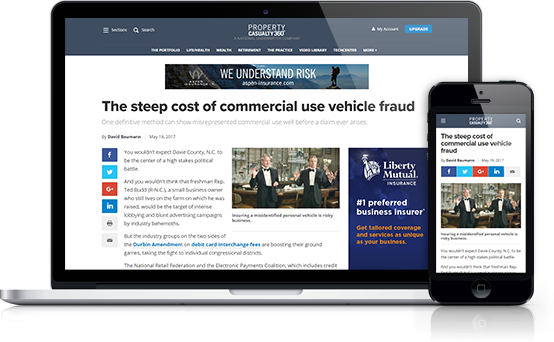With premiums rising and more consumers shopping the market, independent insurance agents are feeling the weight of a hard insurance market. A recent report showed that Q2 of 2023 was the 23rd consecutive quarter of premium increases. Commercial property jumped most out of all lines, at 18.3%.
For Michael Streit, the general manager of EZLynx, explains that it’s not just one factor shifting the market; it’s many. (EZLynx is an Applied Systems company.)
“Simply put, a hard market occurs when carriers emphasize profitability to an extent they haven’t before,” says Streit. “What causes this is lower profits, and one of the more recent drivers is inflation. Carriers wrote risk using assumed liability cost to cover losses, but when the cost of materials and labor expenses surged, profitability declined.”
In addition to inflationary factors, Streit notes carriers are dealing with the high costs associated with extreme weather events, causing many to pull out of certain markets altogether.
As carriers tip the scales back in favor of profitability, independent agents see the direct impacts on their books of business. However, proactively implementing strategies to avoid risks can help shift hard market challenges into opportunities.
Managing the impacts of a hardening market
Current market conditions are having many impacts on independent insurance agents, and Streit breaks them into a few categories.
Impacts on existing book of business. It’s become more challenging for agents to retain existing business, with consumers more likely to shop the market. Premium increases have also become a double-edged sword. Agents earn more per policy due to premium increases, but retention issues emerge.
Difficulty with winning new sales. Higher premiums make it difficult for agents to generate new business. Additionally, some struggle with fewer insurance options due to carriers pulling out in some markets.
Issues related to carriers restricting capacity. Some carriers are restricting capacity and are less likely to give new agents appointments. As a result, newer agents may need to join aggregators to secure appointments.
Streit notes another interesting trend: “We’ve surveyed independent agents for the past 15 years and asked them, ‘What is more important, new business or retention?’ Without fail, the answer historically has always been new business, until this year when it shifted to retention.”
Leveraging technology to support improved retention
As retention issues become a larger challenge for agents, using tools to mitigate customer turnover is proving extremely valuable.
“A retention tool can help you look at your business and flag at-risk policies coming up for renewal,” says Streit. “You can also automatically quote customers, proactively seeing if there’s a better option available for them.”
Automating this process is critical, as it helps agents complete the work at scale and reach more customers at the right time.
“We have looked at the metrics on our tool, EZLynx Retention Center, and the results are pretty incredible,” says Streit. “It improves retention by roughly eight points. So, an agent might have retained 85% of their business in the past, but that rate jumps up to 93%. And with premiums rising, you’re making more commission on each renewal.”
He also recommends using a robust sales tool. For example, a CRM can tell you that you lost a specific customer last year at renewal and that it’s time for them to renew with their new carrier. That is the perfect time to target them strategically.
Transforming struggle into opportunity
Losing customers, having difficult conversations about premiums, and dealing with dwindling policy options are frustrating. But they are also opportunities to transform difficulty into opportunity.
Leveraging technology tools that help overcome a leading challenge right now — such as retention — helps agents better serve their customers and do the shopping for them.
“Now is an opportunity for agents to be thoughtful and efficient with what they’re doing,” says Streit. “There is a lot of noise in the market, and customers are rethinking decisions that may have been automatic in the past, like policy renewals. Using more robust tools allows agents to capture a competitive edge, increase renewals, and strengthen their book of .”
Do you want to hear more? Michael Streit goes further into the topic, including more on the retention improvements, in this exclusive podcast.










 Copyright © 2025 ALM Global, LLC. All Rights Reserved.
Copyright © 2025 ALM Global, LLC. All Rights Reserved.